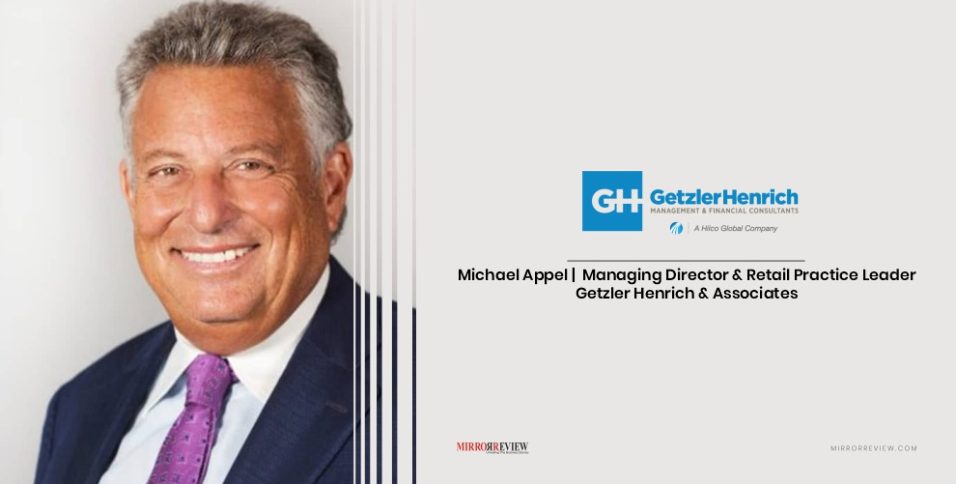The retail industry has been facing unprecedented challenges and headwinds over the past few years. Many businesses are struggling to stay afloat due to the complexities of omnichannel retailing, increased operating costs, and right-sizing inventory. As a result, Q4 earnings have been disappointing, with retailers missing expectations and aggressive inventory clearance promotions taking a toll on margins and bottom lines. Amidst these complexities, there is a leader who has been at the forefront of helping retailers navigate the industry’s growing complexities – Michael Appel, Managing Director and Retail Practice Leader at Getzler Henrich & Associates in New York City.
With over four decades of experience in leading and advising retail and consumer product companies, Michael has worked with many well-known companies, including Baccarat, Laura Ashley N.A., and Rue21. He has deep expertise in women’s apparel, accessories, menswear, children wear, and all categories of home furnishings across various channels of distribution. Given the current challenges that retailers face, Michael emphasizes the importance of investing in technology to manage the industry’s growing complexities and focusing on right-sizing inventory.
A Retail Turnaround Master
Michael has had a remarkable career in the retail industry. Armed with a Phi Beta Kappa degree from Brandeis University and an MBA with distinction from Harvard Business School, he became a renowned expert in retail turnaround and restructuring.
In 1991, he founded Appel Associates, where he held various leadership roles across a broad array of retail functions and categories. He has served as CEO and/or COO and/or turnaround advisor for numerous retailers, from off-price to luxury. His impressive track record includes involvement in high-profile companies such as Laura Ashley, Barney’s, Wilkes-Bashford, Baccarat, Loehmann’s, MacKenzie-Childs, and Kasper/Anne Klein, for which he won the Turnaround Management Association’s company turnaround of the year award.
His career highlights include serving as CEO and Chairman of Rue21, where he led the company’s successful turnaround from Chapter 11 between 2017 and 2020. He was also retained at HCI Direct as CRO to oversee the company’s prepackaged Chapter 11 proceedings and the successful implementation of its restructuring plan. With the departure of HCI Direct’s CEO, he was named Interim CEO, successfully managing the business, achieving planned goals, and introducing a new product line.
In addition to his turnaround management activities, Michael has provided strategic advisory, due diligence, and expert witness consulting services to retailers, financial institutions, and consumer product companies, including Ford Motor Company, Castle Harlan, Whippoorwill Associates (Barney’s New York), and AIG.
Michael’s exceptional leadership skills, extensive experience, and strategic vision have made him an invaluable addition to Getzler Henrich as Managing Director since joining the firm to lead the Retail Practice in April 2022. He is a key contributor to the national retail turnaround and restructuring practice, where he is implementing the business strategy, recruiting key executives, and managing the practice.
Getzler Henrich & Associates: The Gold Standard in Corporate Restructurings
For over half a century, Getzler Henrich & Associates LLC has been a trusted name in middle-market corporate restructurings and operations improvement, delivering growth and profitability for thousands of companies. Founded on principles of integrity and a commitment to honesty, the firm’s unwavering focus on maximizing value for clients has earned it a reputation as one of the nation’s most respected firms in the financial advisory industry. Their approach to rapid, pragmatic decision-making and metrics-driven implementation services has consistently guided companies through both crises and growth phases.
Getzler Henrich’s expertise spans many industries, including “new economy” technology and service firms and “old economy” manufacturing and distribution businesses. Their team of professionals, with years of experience in executive-level positions and broad advisory expertise, has successfully guided both publicly and privately held firms, colleges, and healthcare institutions, demonstrating the firm’s versatility and ability to deliver impactful results across a range of industries.
Michael’s Take on Investing in Technology
Michael believes that investing in technology to manage the industry’s growing complexities is not only an option but also a necessity for retailers who want to remain agile and stay competitive. According to a recent WWD article, retailers are struggling with operating headwinds and increased costs, leading to lackluster earnings. However, despite having access to many digital tools to improve operations and better predict consumer behavior, some retailers are still hesitant to invest in technology. He believes this hesitancy often comes down to a legacy mindset. “Maybe these retailers don’t think their legacy platforms will work with the latest technology, or maybe they just have a legacy mindset and are resistant to implementing changes,” states Michael.
He emphasizes that it is crucial for retailers to be open to change and not resist investing in technology as the retail industry gets more complex and the pace of change accelerates. With the rise of DTC, e-commerce, third-party marketplaces, social shopping, brick-and-mortar, in-store shop-in-shops, resale, and more, retailers need to leverage the benefits of technology to stay ahead of the curve.
Michael also states that investing in technology can be intimidating for merchants; however, it is an investment that pays off. By utilizing digital tools, retailers can predict consumer behavior more accurately, purchase the right assortments, and improve their operations to maximize their use of working capital and improve financial results.
Leading the Charge in Right-Sizing Inventory
As the retail industry looks to recover from the inventory glut of 2022, Michael has been vocal about the importance of right-sizing inventory. He believes that retailers need to focus on having the right inventory mix, rather than simply cutting back on orders. He stresses the need for a balanced mix of inventory, with a focus on not under buying certain categories. Also, retailers that played it too safe may not have the newness and fresh fashion that customers now demand.
“There was such a knee-jerk reaction to cutting forward orders, but the issue now is, do they have the right inventory mix?” “Just cutting back to cut back doesn’t work,” asserts Michael.
It is not just about having the right mix but also about understanding and adapting to changing customer demands. The traditional category of career dressing, for instance, is facing new challenges as the spectrum of what is acceptable in the workplace has broadened. The growth in sneakers and comfort footwear has redefined the whole category, and retailers need to figure this out to provide the right assortment.
Despite career wear challenges, special occasion dressing is performing well, as people are traveling and attending events and weddings. However, Michael warns that while occasion dressing is a bright spot, it is not enough to save the day. Retailers need to have a well-balanced assortment across all categories.
Advice for Retailers
As Michael looks ahead to the future, he sees a challenging and complex landscape on the horizon. The convergence of several economic issues, such as inflation, higher interest rates, limited labor availability, and sourcing difficulties, could make it difficult for retailers to increase revenue and sustain profitability.
Amidst these challenges, Michael recognizes that consumers’ household needs will take priority, and high grocery prices will continue to impact discretionary spending, especially for moderate- and low-income consumers. However, some retailers, like Target and Walmart, may benefit from their robust grocery departments. For other retailers, the road ahead may be more difficult. Michael believes that there are levers that can be pulled to improve gross margins, drive operational efficiencies, and make better use of working capital.
“Retailers that invest in their people, processes, and technology and focus on their customers’ needs will be the ones that thrive in the years ahead,” concludes Michael.
Quote

Also Read: The 10 Influential Personalities in the Retail and Fashion Industry.





